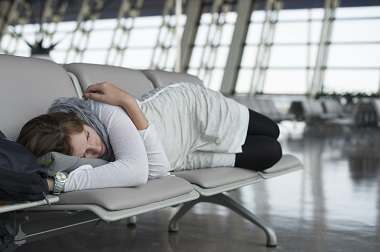What you need to know about jet lag
Traveling across time zones is one of the main reasons people experience jet lag. If you are traveling from west to east, it is worse. If you have a child younger than three, they won’t usually be affected because they usually don’t have a set schedule and adapt well to changes. If you are an adult that can easily adapt, you won’t suffer as much either. On the other hand, if you are dead set on your wake and sleep times and have a definite schedule, you may have problems with jet lag.
 Your condition before flying
Your condition before flying
If you begin your vacation stressed, excited, over-tired, hungover, or nervous, you may end up with a large case of suffering from jet lag. Many travelers thing they can catch up while they are flying but that isn’t the case. A smart traveler will make sure they start their trip well rested so they are bright and chipper the morning of the flight.
Atmospheric conditions
The air on most airplanes is usually extremely dry and this can be very annoying to passengers who are used to humid conditions. This dry air can cause dry skin, headaches and dry throat and nasal membranes. It is also ideal for spreading germs that can cause colds, coughs, the flu or sore throats. Try to drink large amounts of water prior to take-off and carry one with you on the plane. Most airlines give water often to flyers, while other only have water fountains next to toilets. It isn’t recommended to drink tea, coffee, fruit juice or alcoholic drinks during flight. Water is still the best thing for your body.
Cabin pressure and Stale air
Cruising altitude for most aircraft is 30,000 feet and most cabins remain pressurized at 8,000 feet. This may still cause problems for passengers unless you are used to living at 8,000 feet by becoming tired, lethargic, or experience swelling of the hands and feet. The air on the plane is often recycled stale air since it is expensive for airlines to supply constant fresh air. Believe it or not, the air in first class and business class is better than is superior to economy. This may cause headaches to the unfortunate people in the lower class cabins but if you ask your flight attendant, they will probably increase the good air.
Alcohol
 Alcohol is two or three times stronger when you are flying than when you are on land. That means that one glass of an alcoholic beverage will affect you like you had two or three. It is very easy to end your flight feeling quite hungover which will make the problems of jet lag much worse.
Alcohol is two or three times stronger when you are flying than when you are on land. That means that one glass of an alcoholic beverage will affect you like you had two or three. It is very easy to end your flight feeling quite hungover which will make the problems of jet lag much worse.
Food and drink
The tea and coffee you receive in the air really doesn’t taste that great and it also usually has a higher content of caffeine than normal. Both can cause stomach upset as well as orange juice if your body isn’t used to it. Don’t try to drink any of these if your body isn’t used to them. If it is at all possible, try to forego the in-flight meals because your body really doesn’t need them. Your stomach usually is exposed to extra pressure from the seat best and the cramped spaces so eating will only compound the problem. Many international flights serve food your body may not be accustomed to so it is advisable to stay away from them entirely. WHO states that 50% of the travelers that fly international end up with some kind of stomach upset.
Lack of exercise
One major problem with long flights is the lack of proper exercise. It usually causes discomfort during flight and causes problems with extended jet lag later on. Try to stretch during your flight, especially with your legs and try to find a way to elevate your feet for some of the trip. If there are layovers, leave the plane and get some walking in or calisthenics. If you have a long layover, try to use the shower to freshen up. It will also get your blood moving and tone your muscles.

 Subscribe Now
Subscribe Now

 Most people just assume the first day of your vacation after a long flight will be worthless because of jet lag. Don’t sell yourself short. Many people can enjoy productive first days and may even be hyper. You can’t stop jet lag from happening but if you follow these guidelines you can lessen the symptoms.
Most people just assume the first day of your vacation after a long flight will be worthless because of jet lag. Don’t sell yourself short. Many people can enjoy productive first days and may even be hyper. You can’t stop jet lag from happening but if you follow these guidelines you can lessen the symptoms. Think about well-known
Think about well-known